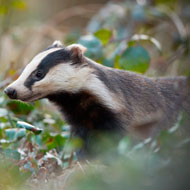
Wildlife charities welcome scheme in TB hotspots
Defra has announced that a new Badger Edge Vaccination Scheme (BEVS) will be launched later this year.
Wildlife charities including the Badger Trust and Care for the Wild have welcomed the move, which will allow charities and other organisations to apply for funding for badger vaccination in bovine TB hotspots.
Vaccination projects within the edge areas will be eligible for funding – these are Hampshire, East Sussex, Berkshire, Oxfordshire, Buckinghamshire, Northamptonshire, Nottinghamshire, Leicestershire, Warwickshire, Derbyshire and Cheshire.
Commenting on the scheme, the Badger Trust's CEO Dominic Dyer said: "It's great to see the government pushing ahead with this scheme. We were helping to evolve a similar plan a year or more ago so it's fantastic that this scheme has taken shape and is being given the full backing of Defra.”
Environment secretary Liz Truss, who recently replaced Owen Paterson, has confirmed that the controversial badger culls will continue in Somerset and Gloucestershire this year.
It is reported that Natural England will monitor this year's culls, rather than an independent expert panel (IEP) as last year.
It was recently announced that the Badger Trust has been granted a judicial review by the High Court, allowing the charity to challenge the legality of conducting the culls without an independent body to monitor their safety, effectiveness and humaneness.
Defra has also revealed the Badger Vaccination Fund will be reopened for applications in 2014.
The BEVS is expected to involve longer term match funding and enhanced training. Criteria for funding and support is likely to require vaccination projects to be undertaken across a minimum area, every year, for a minimum number of years.
Defra says it is working with stakeholders to ensure the scheme offers the best opportunities for privately led, joint-funded vaccination projects.
Read the full Government information note: https://www.gov.uk/government/publications/bovine-tb-information-note-badger-vaccination-fund-2014



 The Greyhound Board of Great Britain has published new vaccination guidance, with all greyhounds registered from 1 January, 2027 required to have the L4 leptospirosis vaccination, rather than L2.
The Greyhound Board of Great Britain has published new vaccination guidance, with all greyhounds registered from 1 January, 2027 required to have the L4 leptospirosis vaccination, rather than L2.